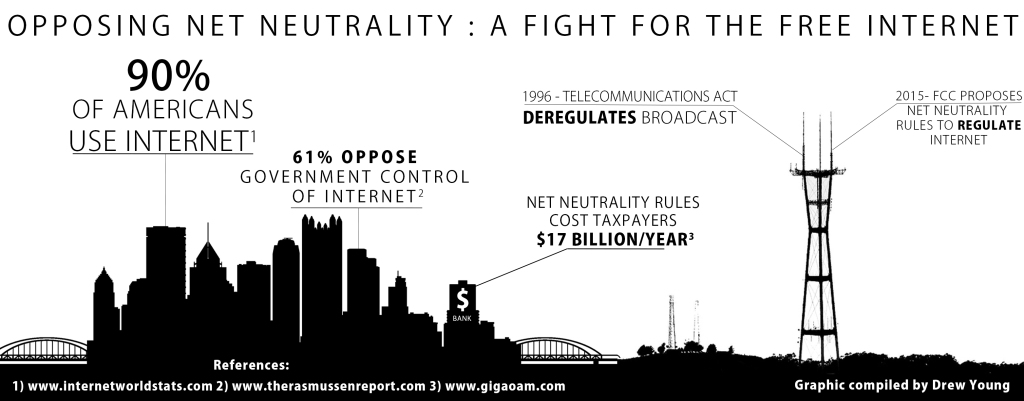By Drew Young
While the concepts of the Federal Communications Commission’s new ‘net neutrality’ rules glimmer with democratic principles on the surface, they pose a deeper impending hindrance on the future of our free speech.
“An Act to promote competition and reduce regulation in order to secure lower prices and higher quality services for American telecommunications consumers and encourage the rapid deployment of new telecommunications technologies.”
Deregulation of Broadcast
While slightly verbose, the title noted above is the foundation for what became otherwise known as the Telecommunications Act of 1996.
This act, in essence, was the federal government’s way of deregulating the broadcast industry in favor of the people’s will.
As the 21st century brought the internet amongst other exponentially growing technological advancements, they were bundled into this deregulated ideology.
However, an unprecedented move by the Federal Government seeks to reshape the free web as we know it.

New Rules Reclassify Internet
A January 2015 FCC Notice of Proposed Rulemaking seeks to reclassify internet service providers from their current place in Section 704 to a Title II utility.
What’s the big deal, and what’s Title II?
The measure touts itself as the only option to protect media consumers from digital “fast lanes”, or paid prioritization of certain digital media.
Can’t watch your favorite episode of House of Cards on Netflix or funny cat video on YouTube due to constant buffering? Proponents of net neutrality say: “The government will fix that.”
New rules prevent providers from charging users to upgrade the speed of their favorite content.
Sounds great, right?
Regulatory Burdens
However, it buries companies under 200 pages of regulatory burdens that will have more negative far-reaching impacts for citizens than positive.
Riding on the heels of recent NSA spying measures, the underlying motives of net neutrality have a familiar scent of government overreach.
Turning the internet into a utility, much like your water or electric, places the feds right into the middle of your access to the web, leaving the door wide open for censorship.
In an interview with the Chicago Tribune, FCC commissioner Ajit Pai stated that, “While the plan contains no shortage of regulations, the most problematic may be the new “Internet conduct” rule. It’s a vague rule that gives the FCC almost unfettered discretion to micromanage virtually every aspect of the Internet, including the choices that consumers have for accessing it.”
Pai’s chief of staff, Matthew Berry, further released information that the FCC was attempting to block the comissioner from releasing information about the laws.
There is an astounding level of irony in the fact that rules regarding freedom are now being held in secrecy.
Americans must take action to protect themselves against this violate of free speech and expression. To join the growing number of people who have joined in the fight for the free internet visit: www.battleforthenet.com

Leave a Reply